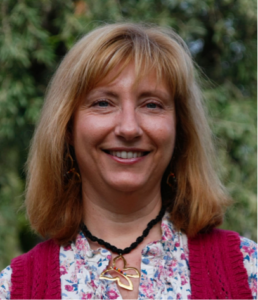KEY UNIVERSITY REPRESENTATIVES
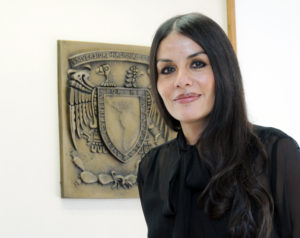 Aimée Vega Montiel is Researcher, National Autonomous University of Mexico. She is an expert on gender and media and Vice President, International Association for Media and Communication Research (IAMCR). She Chairs the Latin American Chapter of the ‘Global Alliance on Media and Gender’ (GAMAG). She is also Co-Chair of UNESCO Unitwin on Gender, Media and ICTs.
Aimée Vega Montiel is Researcher, National Autonomous University of Mexico. She is an expert on gender and media and Vice President, International Association for Media and Communication Research (IAMCR). She Chairs the Latin American Chapter of the ‘Global Alliance on Media and Gender’ (GAMAG). She is also Co-Chair of UNESCO Unitwin on Gender, Media and ICTs.
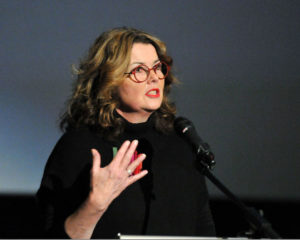 Lisa French is Professor and Dean of the School of Media and Communication at RMIT University (Melbourne, Australia) and co-chair of The UNESCO-UN Media, Gender and ICTs University Network (UNITWIN). She is the co-author of several books, including Womenvision: Women and the Moving Image in Australia (2003). Her PhD and MA research were both interested in gender and film, and she has published widely in these fields in local and international journals. In 2012 she published the results of a major research project on the participation of women in film and television industries in Australia: Women in the Victorian Film, Television and Related Industries. Lisa acted as UNESCO’s regional moderator for online debates prior to the Global Forum on Media (Bangkok, 2013); was part of the drafting committee for the Action Plan for the Asia-Pacific Regional Global Alliance of Media and Gender (GAMAG); has presented at several UNESCO General Assemblies; and published in the UNESCO book Media in Support of Sustainable Development and a Culture of Peace. She is a member of the ‘Gender Matters Taskforce’, an initiative of the Australian Federal Government agency Screen Australia.
Lisa French is Professor and Dean of the School of Media and Communication at RMIT University (Melbourne, Australia) and co-chair of The UNESCO-UN Media, Gender and ICTs University Network (UNITWIN). She is the co-author of several books, including Womenvision: Women and the Moving Image in Australia (2003). Her PhD and MA research were both interested in gender and film, and she has published widely in these fields in local and international journals. In 2012 she published the results of a major research project on the participation of women in film and television industries in Australia: Women in the Victorian Film, Television and Related Industries. Lisa acted as UNESCO’s regional moderator for online debates prior to the Global Forum on Media (Bangkok, 2013); was part of the drafting committee for the Action Plan for the Asia-Pacific Regional Global Alliance of Media and Gender (GAMAG); has presented at several UNESCO General Assemblies; and published in the UNESCO book Media in Support of Sustainable Development and a Culture of Peace. She is a member of the ‘Gender Matters Taskforce’, an initiative of the Australian Federal Government agency Screen Australia.
 Claudia Padovani is Associate Professor in Political Science and International Relations at the University of Padova (Italy) where she teaches courses in International Communication and Communication Governance. She co-chairs the UNESCO-UN Media, Gender and ICTs University Network (UNITWIN) and is currently involved in the Advancing Gender Equality
Claudia Padovani is Associate Professor in Political Science and International Relations at the University of Padova (Italy) where she teaches courses in International Communication and Communication Governance. She co-chairs the UNESCO-UN Media, Gender and ICTs University Network (UNITWIN) and is currently involved in the Advancing Gender Equality
in Media Industries (AGEMI) EU-funded project. Her main areas of interest concern the transformation of political processes in the global context and their connection to the evolution of communication dynamics and technologies, with a special focus on gender, communication rights
and social justice. She recently co-edited Gender Equality and the Media: A Challenge for Europe (with Karen Ross, Routledge 2017) and The Politics of Media Gender Equality: Lessons learned and struggles for change twenty years after the Beijing Fourth World Conference on Women (Padovani
and Pavan 2017). She co-chairs the Working Group on Global Media Policy at the IAMCR, where she is also involved with the Task Force on the UNESCO-promoted Global Alliance on Media and Gender.
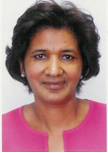 Emily May Brown is a Senior Lecturer in Journalism and Media Technology at the Namibia University of Science and Technology (NUST), formerly the Polytechnic of Namibia. The Department of Communication – which hosts the Journalism and Media Technology Degree programmes – also serves as home to programmes in Communication and English. Her areas of specialisation are Media Law, Science Journalism, Media Advertising Strategies and Gender in the Media and Media Education. Of importance to her is to assess the extent to which gender is mainstreamed in Journalism curricula. In this context she authored the publication “A Gender Toolkit for Educators” (2010). She holds Degrees in Sociology and Communication, and Journalism/Mass Communication. Presently, Emily Brown serves as the Chair of Gender Links Southern Africa, a regional NGO with its Headquarters in Johannesburg, South Africa. In Namibia she represents NUST on the National Commission to UNESCO (NATCOM) and has membership in ORBICOM. As a Fulbright alumnus, she is a member of the Namibia/United States Alumni Association.
Emily May Brown is a Senior Lecturer in Journalism and Media Technology at the Namibia University of Science and Technology (NUST), formerly the Polytechnic of Namibia. The Department of Communication – which hosts the Journalism and Media Technology Degree programmes – also serves as home to programmes in Communication and English. Her areas of specialisation are Media Law, Science Journalism, Media Advertising Strategies and Gender in the Media and Media Education. Of importance to her is to assess the extent to which gender is mainstreamed in Journalism curricula. In this context she authored the publication “A Gender Toolkit for Educators” (2010). She holds Degrees in Sociology and Communication, and Journalism/Mass Communication. Presently, Emily Brown serves as the Chair of Gender Links Southern Africa, a regional NGO with its Headquarters in Johannesburg, South Africa. In Namibia she represents NUST on the National Commission to UNESCO (NATCOM) and has membership in ORBICOM. As a Fulbright alumnus, she is a member of the Namibia/United States Alumni Association.
Rosa María Torres Valdés has a PhD in Advertising and Public Relations, with a specialisation in Local Development. She also holds a Master of Biotechnology and Biomedicine and a Postgraduate Degree in Social Responsibility (UNDP). Full Professor at the University of Alicante, she was the Director of the Cabinet of Initiatives for Employment (1995-2012), and prior to that, an entrepreneur in the field of Public Relations. Rosa María Torres Valdés received the Caja de Ahorros del Mediterráneo Award in 2009 on International Women’s Day. Her experience includes numerous international stays in Colombia, Tunisia, Italy, France and Costa Rica and her research lines focus on: educational innovation and public relations applied to Local Development and Tourism; Social Responsibility and Social Innovation; Scientific communication of proximity; Political Communication and Gender, Resignification and Gender; as well as music applied to educational play activities. She has led projects related to gender issues funded both by the EU (Equal Concepción Arenal) and locally (Tempo Mujer, Dona de Mar, etc.) by public and private bodies. In 2019, she organised the Gender Resignification, UniTwin in Alicante. https://www.unitwinalc19.ua.es/en/presentation
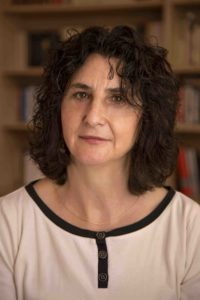 Juana Gallego Ayala has been Professor at Autonomous University of Barcelona since 1989 and is now the director of Observatory for Equality. In 2001 she was awarded the first prize in the Awards to Research into Audiovisual Communication by the Catalan Audiovisual Council for a project she lead, which was later published in the book La prensa por dentro (Journalism from the inside). Some of her outstanding publications include: Periodismo social (2014); De reinas a ciudadanas. Medios de comunicación ¿motor o rémora para la igualdad (2013); Putas de película. Cien años de prostitución en el cine (2012); Eva devuelve la costilla, (2010) and the pioneering Mujeres de papel. La prensa femenina en la actualidad (1990), and the books chapters “Many Women, Little Power” in the Handbook of Women and Journalism (2013) and a contribution in the volum Women and Violence in Spanish Culture: From Vulnerability to Accountability, to be published soon.
Juana Gallego Ayala has been Professor at Autonomous University of Barcelona since 1989 and is now the director of Observatory for Equality. In 2001 she was awarded the first prize in the Awards to Research into Audiovisual Communication by the Catalan Audiovisual Council for a project she lead, which was later published in the book La prensa por dentro (Journalism from the inside). Some of her outstanding publications include: Periodismo social (2014); De reinas a ciudadanas. Medios de comunicación ¿motor o rémora para la igualdad (2013); Putas de película. Cien años de prostitución en el cine (2012); Eva devuelve la costilla, (2010) and the pioneering Mujeres de papel. La prensa femenina en la actualidad (1990), and the books chapters “Many Women, Little Power” in the Handbook of Women and Journalism (2013) and a contribution in the volum Women and Violence in Spanish Culture: From Vulnerability to Accountability, to be published soon.
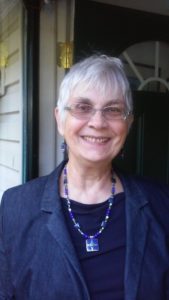 Carolyn M. Byerly, PhD, is professor and chair of the Department of Communication, Culture & Media Studies at Howard University, USA. Dr. Byerly is the interim chair of the Research and Policy Committee of the ‘Global Alliance on Media and Gender’ (GAMAG). She is an international scholar of media with research interests in gender and race issues, critical political economy of media, media policy, media employment, and media activism. She is the author or editor or co-editor of four books, including The Palgrave International Handbook of Women and Journalism (2013), Global Report on the Status of Women (2011), Women and Media: A Critical Introduction (2006), and Women and Media: International Perspectives. She has published more than 50 articles in communication journals and edited volumes, as well as other reports.
Carolyn M. Byerly, PhD, is professor and chair of the Department of Communication, Culture & Media Studies at Howard University, USA. Dr. Byerly is the interim chair of the Research and Policy Committee of the ‘Global Alliance on Media and Gender’ (GAMAG). She is an international scholar of media with research interests in gender and race issues, critical political economy of media, media policy, media employment, and media activism. She is the author or editor or co-editor of four books, including The Palgrave International Handbook of Women and Journalism (2013), Global Report on the Status of Women (2011), Women and Media: A Critical Introduction (2006), and Women and Media: International Perspectives. She has published more than 50 articles in communication journals and edited volumes, as well as other reports.
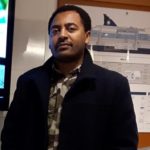 Melisew Dejene Lemma is Assistant Professor of Journalism & Communication and a PhD Fellow in Development Studies at Center for Policy and Development Research, Hawassa University, Ethiopia and a visiting student at the University of Life Science, NMBU, 2015/16 at Noragric. Melisew received his B.A in Foreign Language & Literature (with distinction from Addis Ababa University, Ethiopia) and his M.A. in Journalism & Mass Communication (High Honors/ Magna Cumlaude) (The American University in Cairo, class of 2009), after winning The African Graduates Fellowship scholarship award. He is an International Visitors Leadership Program ( IVLP) 2015 alumnus in Contemporary Trends in Higher Education that he traveled to five US States -Washington DC, Maryland, Ohio (Dayton & Columbus), Dallas/Texas and Boston/Massachusetts and attended training and presentations with various US Universities and professional groups among others Massachusetts Institute of Technology ( MIT), Harvard University’s Innovation Lab, University of Boston.
Melisew Dejene Lemma is Assistant Professor of Journalism & Communication and a PhD Fellow in Development Studies at Center for Policy and Development Research, Hawassa University, Ethiopia and a visiting student at the University of Life Science, NMBU, 2015/16 at Noragric. Melisew received his B.A in Foreign Language & Literature (with distinction from Addis Ababa University, Ethiopia) and his M.A. in Journalism & Mass Communication (High Honors/ Magna Cumlaude) (The American University in Cairo, class of 2009), after winning The African Graduates Fellowship scholarship award. He is an International Visitors Leadership Program ( IVLP) 2015 alumnus in Contemporary Trends in Higher Education that he traveled to five US States -Washington DC, Maryland, Ohio (Dayton & Columbus), Dallas/Texas and Boston/Massachusetts and attended training and presentations with various US Universities and professional groups among others Massachusetts Institute of Technology ( MIT), Harvard University’s Innovation Lab, University of Boston.
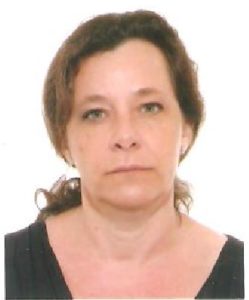 Patricia Núñez- Gómez is Professor of Advertising in Faculty of Media & Communication Sciences at Complutense University (Madrid, Spain) and chair of the Advertising Research TWG in Ecrea (European Communication Research and Education Association). Her publications are about teens and digital literacy, social networks, creativity and innovative teaching strategies.
Patricia Núñez- Gómez is Professor of Advertising in Faculty of Media & Communication Sciences at Complutense University (Madrid, Spain) and chair of the Advertising Research TWG in Ecrea (European Communication Research and Education Association). Her publications are about teens and digital literacy, social networks, creativity and innovative teaching strategies.
She researches digital literacy and teens, gender and ICTs, empowering kids through media. She has participated in UNESCO online course about media literacy and leads different International and national projects in these fields. She is the co-chair of GECA, international group in gender and media. She also belongs to CIPI as executive board (International Council for the protection of children), and is collaborating with different projects in Africa, Colombia, Brasil and Tibet related to media and kids.
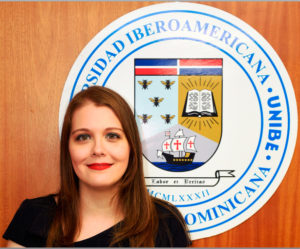 Dr. Aída Mencía-Ripley is a clinical psychologist who currently leads her research Department as its Dean. She is also UNESCO Chairholder on Inclusive Education for People with Disabilities and Special Education Needs. Under her leadership UNIBE has opened several research institutes and laboratories that seek to study health care issues such as access to care in HIV+ individuals, quality of life of caregivers of people with disabilities, literacy acquisition in children living in low resource environments, innovation in dental research, oral health initiatives in children from low resource setting among others. Her personal research interests have focused on gender issues ranging in studying women´s responses to objectifying media images to gender identity and blood pressure. She is currently the Monitoring and Evaluation Specialist of Project Read which seeks to improve literacy in Dominican public schools as well as reduce acceptability of gender based violence, bullying and increase acceptance of students with disabilities.
Dr. Aída Mencía-Ripley is a clinical psychologist who currently leads her research Department as its Dean. She is also UNESCO Chairholder on Inclusive Education for People with Disabilities and Special Education Needs. Under her leadership UNIBE has opened several research institutes and laboratories that seek to study health care issues such as access to care in HIV+ individuals, quality of life of caregivers of people with disabilities, literacy acquisition in children living in low resource environments, innovation in dental research, oral health initiatives in children from low resource setting among others. Her personal research interests have focused on gender issues ranging in studying women´s responses to objectifying media images to gender identity and blood pressure. She is currently the Monitoring and Evaluation Specialist of Project Read which seeks to improve literacy in Dominican public schools as well as reduce acceptability of gender based violence, bullying and increase acceptance of students with disabilities.
 Dr. Edgar Vega Suriaga is Doctor in Theory of Literature and Comparative Literature, and Master of Journalism and Communication from the Facultat de Ciències de la Comunicació from the Universitat Autónoma de Barcelona. Licenciate in Comunicación Social from the Universidad Central del Ecuador. Currently Teacher Investigator of the Área de Comunicación, and Coordinator of the Maestria en Estudios de Recepción Mediatica of the Universidad Andina Simón Bolívar. My latest publication: “¿Quieres ver cómo se mata a una puntita?: Masculinidad y medios de comunicación”, en VV.AA., Los derechos de las mujeres en la mira: Observatorios de sentencias judiciales y de medios, 2013-2014, UASB, UPS, Corporación Humanas-Ecuador, Centro Regional de Derechos Humanos y Justicia de Género. Now I am undertaking the investigation titled: “Mirada y visión masculina en la espectacularización contemporánea”, in which I will attempt to uncover the conditions of the contemporary visual regime which contribute to the naturalisation of gender violence.
Dr. Edgar Vega Suriaga is Doctor in Theory of Literature and Comparative Literature, and Master of Journalism and Communication from the Facultat de Ciències de la Comunicació from the Universitat Autónoma de Barcelona. Licenciate in Comunicación Social from the Universidad Central del Ecuador. Currently Teacher Investigator of the Área de Comunicación, and Coordinator of the Maestria en Estudios de Recepción Mediatica of the Universidad Andina Simón Bolívar. My latest publication: “¿Quieres ver cómo se mata a una puntita?: Masculinidad y medios de comunicación”, en VV.AA., Los derechos de las mujeres en la mira: Observatorios de sentencias judiciales y de medios, 2013-2014, UASB, UPS, Corporación Humanas-Ecuador, Centro Regional de Derechos Humanos y Justicia de Género. Now I am undertaking the investigation titled: “Mirada y visión masculina en la espectacularización contemporánea”, in which I will attempt to uncover the conditions of the contemporary visual regime which contribute to the naturalisation of gender violence.
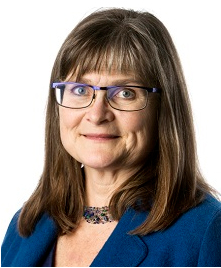 Maria Edström is an Associate Professor and researcher at The Department of Journalism, Media and Communication (JMG), University of Gothenburg. She has a background a journalist, primarily in radio and print and received her PhD in Journalism & mass communication in 2006. Edstrom served as a regional coordinator in the study “Global Report on the Status of Women in the News Media” organised by International Women’s Media Foundation, IWMF (2009-2011), and she is the national coordinator for Global media Monitoring Project. Edström has been a board member of the Swedish Broadcasting Commission (2007-2015), she has served as a research officer at The Swedish Secretariat for Gender Research (2011-2012) and as research officer at Nordicom, leading a Nordic gender and media project (2012-2014). She is currently involved in research regarding freedom of expression, ageing and media (Agecap) and two gender projects; Comparing Gender and Media Equality across the Globe and AGEMI.
Maria Edström is an Associate Professor and researcher at The Department of Journalism, Media and Communication (JMG), University of Gothenburg. She has a background a journalist, primarily in radio and print and received her PhD in Journalism & mass communication in 2006. Edstrom served as a regional coordinator in the study “Global Report on the Status of Women in the News Media” organised by International Women’s Media Foundation, IWMF (2009-2011), and she is the national coordinator for Global media Monitoring Project. Edström has been a board member of the Swedish Broadcasting Commission (2007-2015), she has served as a research officer at The Swedish Secretariat for Gender Research (2011-2012) and as research officer at Nordicom, leading a Nordic gender and media project (2012-2014). She is currently involved in research regarding freedom of expression, ageing and media (Agecap) and two gender projects; Comparing Gender and Media Equality across the Globe and AGEMI.
Sylvia Masese Machini is a PhD Candidate in Media and Communication. She holds a M.A (Mass Communication) and a PGD ( Mass Communication) from the University of Nairobi. Sylvia lectures at the Multimedia University of Kenya and has been a Media, Communication, Film and Public Relations Expert for 30 years. Her research interests include: Media, Gender, Youth and ICT Observatory: for the critical assessment of participation and equity in media systems, content and companies; forming the evidence basis for action, monitoring trends, decision-making, governance, policy. Gender Media and ICT Industry Partnerships: to undertake research into media industries, as well as to partner with them and undertake research aimed at understanding policy contexts and best practice initiatives across industry, government, training. Gender Media and ICT pedagogy: to publish research into appropriate methods, practices and concepts for teaching/education.
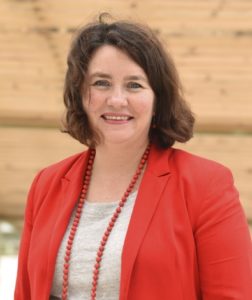 Maria Soledad Vargas Carrillo is a Spanish teacher and journalist. She has a degree in Hispanic Language and Literature and she is a Spanish teacher from Pontificia Universidad Católica de Valparaíso, Chile. Also she has a degree in Social Communication from Universidad de Playa Ancha de Ciencias de la Educación, Chile and a Master and PhD in Journalism from Universidad Autónoma de Barcelona, España.
Maria Soledad Vargas Carrillo is a Spanish teacher and journalist. She has a degree in Hispanic Language and Literature and she is a Spanish teacher from Pontificia Universidad Católica de Valparaíso, Chile. Also she has a degree in Social Communication from Universidad de Playa Ancha de Ciencias de la Educación, Chile and a Master and PhD in Journalism from Universidad Autónoma de Barcelona, España.
Today, she is a professor in the Journalism Department at Pontificia Universidad Católica de Valparaíso, where she teaches Journalistic Writing 1 and Journalistic Writing 2. She is also the Director of the Master in Communication and Post Graduate Program in Strategic Communication at the same university. Her line of research and interests includes Feminism, History of Journalism and Journalism and Literature.
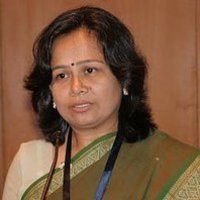 Mira K Desai is Associate Prof & i/c HOD, Department of Extension Education. Currently Mira is In-Charge Head of the Department of Extension Education, S.N.D.T. Women’s University. She joined the same Department as Reader in Communication Technology in July 1998. She started her professional career as Social Researcher with DECU/ISRO and eventually worked at EMRC Ahmedabad and Mahila Samakhya Gujarat prior to joining SNDTWU in 1997 as visiting faculty. She has formal qualifications in Commerce (B.Com.), Development Communication (M.D.C.), Distance Education (M.A. DE), Extension Education (PhD), Participatory Research, Women’s Studies and gender besides two MOOCs. She has worked for print media (reporting for TOI Ahmedabad), television production (researcher, scriptwriter and anchor), Internet (blogger as well as content provider), and alternate media (newsletter editor and documentary filmmaker) environments besides having grassroots experience in rural women’s empowerment programme before entering academics. She has presented papers at number of IAMCR and AMIC conferences and has number of publications to her credits including five books and Government of India recognition for her book manuscript for neo-literates besides research publications, book chapters and popular articles. Her areas of interests are audience reception, Indian television, research methodology, women’s studies/gender and development, and sociology of technology.
Mira K Desai is Associate Prof & i/c HOD, Department of Extension Education. Currently Mira is In-Charge Head of the Department of Extension Education, S.N.D.T. Women’s University. She joined the same Department as Reader in Communication Technology in July 1998. She started her professional career as Social Researcher with DECU/ISRO and eventually worked at EMRC Ahmedabad and Mahila Samakhya Gujarat prior to joining SNDTWU in 1997 as visiting faculty. She has formal qualifications in Commerce (B.Com.), Development Communication (M.D.C.), Distance Education (M.A. DE), Extension Education (PhD), Participatory Research, Women’s Studies and gender besides two MOOCs. She has worked for print media (reporting for TOI Ahmedabad), television production (researcher, scriptwriter and anchor), Internet (blogger as well as content provider), and alternate media (newsletter editor and documentary filmmaker) environments besides having grassroots experience in rural women’s empowerment programme before entering academics. She has presented papers at number of IAMCR and AMIC conferences and has number of publications to her credits including five books and Government of India recognition for her book manuscript for neo-literates besides research publications, book chapters and popular articles. Her areas of interests are audience reception, Indian television, research methodology, women’s studies/gender and development, and sociology of technology.
MEMBERS
Angie Diaz
Angie Díaz is an Advertising and Communications professional with more than 15 years of experience. She is a graphic designer, illustrator and creative strategist. She has worked in important advertising agencies in the Dominican Republic and Spain developing creative strategies for international products. For more than a decade, she has focused her work on social development. She currently works as a consultant for various governmental and non-governmental institutions such as Plan Internacional and UNICEF with focus on gender and equality. She has created important projects such as the local Learn Without Fear Campaign, 4% for education Social Movement, the Because I Am a Girl campaign for Plan International and the coordination of The Worst Soap Opera campaign for UNICEF, which has won numerous awards, including the first Glass Cannes Lion for the Dominican Republic. She is a professor of Creative Writing and Storytelling in her alma mater, Universidad Iberoamericana (UNIBE) and Head of the Creativity Program at The Atomic Garden. She is also a breastfeeding activist, having written numerous guides and articles on the subject.
Francisco José García-Ramos
Dr. Francisco José García-Ramos is Professor at the Complutense University of Madrid (Spain), where he teaches in the Degrees and Master’s Degree in Advertising and Audiovisual Communication, and in the MA in LGBTIQ+ Studies. He graduated in Information Sciences and also in Art History (Complutense University), and has a PhD in Contemporary Art History. He is currently researching on the presence of women in the History of photojournalism. Widely expertised in the fields of creativity and audiovisual culture, both within advertising and film and TV. He has undertaken research in Gender and LGBTIQ+ Studies within the framework of various I+D+I projects by the History Institute-CSIC, in his research stays at King’s College London (United Kingdom) and Leipzig University (Germany), as well as within the Complutense Research Group GECA (Gender, Aesthetics and Audiovisual Culture). He is co-editor of the special issue of Comunicar Journal: ‘Gender Equality, Media, and Education: A Necessary Global Alliance’ (2020-2).
Mark Poole
Dr Mark Poole teaches at RMIT University in film, documentary and screenwriting. His research focus is particularly concerned with the nexus between writing and directing. He is the head of the Australian Directors’ Guild in Victoria, Australia, and has an extensive list of credits as a screenwriter and director in both drama and documentary. His work have received numerous awards including the prestigious Richard Lane Award for screenwriting. His short film Basically Speaking won a certificate of merit at the St Kilda Film Festival. He is currently working on a feature length documentary on the work of acclaimed Australian screenwriter and director Jan Sardi about his work on the feature films Shine and Mao’s Last Dancer. He is also working on the documentary project The Female Gaze with Lisa French. Mark is interested in research on gender and diversity in media and assists with the UNESCO Unitwin network on gender, media and ICTs.
Alex Wake
The program manager for the Bachelor of Communication (Journalism) at RMIT University in Melbourne (Australia), Alexandra Wake’s career as researcher and academic runs parallel to her extensive experience as a journalist in the Middle East and the Asia Pacific Areas. Her main research interest focuses on international collaborations and production by journalists and educators. She was worked training new journalists in emerging democracies and in the coverage of traumatic conflicts and diverse cultural groups, a task she has also undertaken within the South African Broadcasting Corporation (South Africa). She is a peer reviewer for several journalism focused journals, has published numerous articles and chapters regarding the quality of the training in the field of educommunication. She has been awarded grants by the Journalism Education and Research Association of Australia (JERAA) and the Ian Potter Foundation. As a researcher in the International UNESCO UniTWIN Network on Gender, Media and ICTs she develops international cooperative projects.
Francisco A. Zurian
Associate Professor of Audiovisual Communication, Director of International Research Group “Gender, Aesthetics and Audiovisual Culture (GECA)” (www.ucm.es/geca), and Director of Sexual Diversity and Gender Identity Office (UCMd+i) of University Complutense of Madrid (UCM). His main areas of research interest concern Cultural Studies, Gender and Sexuality (with special focus on Studies on Masculinities and LGBTIQ+ Studies) and the Aesthetics and Theory of Film and Audiovisual Media. Author of numerous publications among which we highlight the books: Pensar el cine (2011); Imágenes del Eros. Género, sexualidad, estética y cultura audiovisual (2011); Imagen, cuerpo y sexualidad. Representaciones del cuerpo en la cultura audiovisual contemporánea (2013); Construyendo una mirada propia: mujeres directoras en el cine español (De los orígenes al año 2000) (2015); Diseccionando a Adán. Representaciones audiovisuales de la masculinidad (2015); Miradas de mujeres: cineastas españolas para el siglo XXI (Del 2000 al 2015) (2017) y Representaciones torcidas: el audiovisual LGBTIQ+ en España y Latinoamérica (in press).
Covadonga Ordóñez García
Associate Professor in the Department of Applied Economic Analysis of the University of Alicante. Graduated in Economics, with postgraduate EU studies and a Master in Migration studies. In 2000 she received the award from the Women Studies Centre of the University of Alicante for the “Women Opportunities Guide”. She has taken part in many European projects relating to the internationalisation of universities and migration issues. She is currently collaborating with the UNESCO UNITWIN Network on Gender, Media and ICTs, and belongs to the research group “Interculturality, cognition, interpretation, Translation and Organisation of communicative interaction” and TGR-SYLLABUS GENDER for innovative education.
Helena Establier Pérez
Director of the Institute for Gender Studies Research at the University of Alicante. She also directs “Research in Gender” group and the scientific journal Feminismo/s.. She is coordinator of the Title of “Expert in Gender Violence: an interdisciplinary approach” of the University of Alicante. Professor of Spanish Literature in the Department of Spanish Language and Literature, General Linguistics and Literature Theory of the University of Alicante. Her main research line addresses the relationships between Gender Studies and Literary Studies,and she is member of the BIESES group (Bibliography of Women Spanish Writers) of the Spanish Open University (UNED).
UNIVERSITIES
National Autonomous University of Mexico (Spanish: Universidad Nacional Autónoma de México – UNAM) is the largest university in Latin America. As a public university in Mexico City, the UNAM is widely regarded by many university world rankings as the leading university of the Spanish-speaking world. UNAM was founded, in its modern form, on 22 September 1910 by Justo Sierra. UNAM owns and uses for academic activities the old buildings located in downtown Mexico City that once belonged to the old Royal and Pontifical University of Mexico. UNAM’s autonomy, granted in 1929, has given it the freedom to define its own curriculum and manage its own budget without interference from the government. This has had a profound effect on academic life at the university, which some claim boosts academic freedom and independence. The UNAM generates a number of different publications in diverse areas, such as mathematics, physics and history.
RMIT University was founded in 1887, RMIT is a public, global university of technology, design and enterprise. It is Australia’s second largest university. The main campus in in the city of Melbourne Australia and there is a campus in Vietnam (Ho Chi Minh City), and Spain (Barcelona). The mission is to provide transformative experiences for our 83,025 students, getting them ready for life and work, and to help shape the world with research, innovation, teaching and engagement. Key strengths include media, journalism, communication, art and design. RMIT is rated 5 (the highest- above world standing) for Communication and Media in the Australian Government’s (ARC) ‘Excellence in Research Australia’ rankings. RMIT is managed by a Chancellor, Vice-Chancellor, executive teams and employs 4947 continuous staff in academic, administration and support service roles. The annual budget is A$1.63 billion which is obtained from government, student fees, grants and other sources. http://www.rmit.edu.au
SNDT Women’s University completed 100 years of its glorious existence in July 2016. Established in 1916 by a social reformer Bharat Ratna Maharshi Dodo Kesav Karve for widows’ education, today it is synonymous with women’s education and empowerment in India. The motto of the university is “An enlightened woman is a source of infinite strength”. It is the first women’s university of India and South East Asia. The University comprises of 39 University Departments, 13 Institutions including conducted colleges, four centres, 166 affiliated colleges and an autonomous college. There are six institutions recognized by SNDT for Ph. D. Research. SNDT is a home to 1100 teaching and non-teaching staff members and 50,000 students spread across seven states and a union territory. In the academic year 2015-16, the University offered 250 programmes ranging from diploma to Ph.D. in 15 faculties. SNDT Women’s University is in top 50 multi-disciplinary universities of India and sixth in Western India according to the Week Hansa Research ranking of 2016.
University of Padova: Dating back to 1222, the University of Padova is one of Europe’s oldest and most prestigious seats of learning; it is a multi-disciplinary university that aims to provide its students with both professional training and a solid cultural background. The University offers its students 32 departments, 37 doctoral degree courses activated this year, 2 international doctoral degree courses and 44 research and service centres across the spectrum of sciences, medicine, social sciences and humanities, with more than 2,000 professors and researchers employed. The University of Padova is one of the first subscribers of the Statement of Commitment for the implementation of the European Charter of Researchers and was rewarded with the ‘HR Excellence in Research’ logo by the European Commission in 2012. The first report issued by the National Agency for the Evaluation of Universities and Research Institutes set the university of Padova as the highest ranking among leading Italian Universities for the quality of its research results for the period 2004 – 2010.
The Namibia University of Science and Technology (NUST), formerly the Polytechnic of Namibia is based in the Capital City, Windhoek, with Centres for Open and Life-long Learning in 13 out of Namibia’s 14 regions. As a tertiary education institution, the Institution offers a range of Degree programmes (up to the Doctoral level) in a variety of disciplines such as Journalism and Media Technology; Engineering; Information and Communication Technology; Architecture; English; Nature Conservation; Town and Regional Planning; Land-use Planning; Health Sciences; Bio-Medical Science; Mining; Finance; Accounting; MBA’s in Leadership and International Relations; Criminal Justice and Police Science; and so forth. It has played a significant role in terms of research with regard to renewable energy, solar energy and mining engineering. Modes of study at NUST are full-time, part-time (from 17h15 – 21h30) and the Distance (non-resident) mode. Approximately one-third of the NUST students have registered for the Distance mode of study. The Journalism and Media Technology programmes are not offered via the Distance mode of study because of its applied nature. NUST was established by an Act of Parliament in November 2015, and its forerunner – the Polytechnic of Namibia – was established in 1995. Since then the Campus has more than quadrupled in size, and is known for establishing sound partnerships with universities across the world.
Complutense University of Madrid is a public research university located in Madrid, and one of the oldest universities in the world. The university enrolls over 86,000 students, and consistently ranks as the top university in Spain. It is located on a sprawling campus that occupies the entirety of the Ciudad Universitaria district with annexes in an others districts. The University currently offers nearly 80 possible majors, 230 individual degrees, and 221 doctorate programs. The School of Communication is known particularly for its role as one of the premiere pre-screening locales in Spain-all major Spanish film productions are screened first before an audience of Complutense students, with the main actors or production figures of the films attending a post-screening press conference.
Howard University is a doctoral-level, federally chartered, private university located in Washington, DC, USA. Howard was established by the Congress of the United States in 1867 to educate persons of African descent and other underserved populations, and to advance knowledge for and about the constituency it serves. Howard has a student population of more than 10,000 students, approximately a third of those in graduate-level (master’s or doctoral) programs. Its undergraduate, professional and joint-degree programs span more than 120 areas of study within 13 schools and colleges.
Hawassa University (HU) was established at Hawassa in April 2000 G.C. Since 1976, the different colleges of HU had been operational starting with the College of Agriculture. It is situated in Southern Ethiopia at the heart of the Great Rift Valley Region. Today, HU is a comprehensive University engaged in the provision of all-rounded education, relevant research, training, and community services through its diversified areas of academic units. In 2015, it ranked first for its best performance from among First Generation universities all over Ethiopia. Currently, HU has 6,863 staff members and 39,107 students enrolled in its various programs, both undergraduate and post-graduate. Hawassa University exists to advance knowledge, enhance technology generation and transfer, promote effective entrepreneurship, and inculcate a responsible and democratic attitude through quality and relevant education, research, and community services; thereby, contributing towards the achievement of the University’s and national vision.
The Autonomous University of Barcelona (UAB) is a public university established in 1968. It ranks 126th in the world, according to the University Ranking by Academic Performance (URAP-2016-2017) and 167th according to Best Global University in 2017 (BGU 2017). At UAB there are more than 40,000 students, including undergraduate, graduate and doctoral students, as well as 4,000 teaching staff. This university is committed to gender equality and has its own Observatory for Equality, founded in 2005, responsible for the design and evaluation of the institution’s equality policies.
In the last years, the Observatory for Equality has included the perspective of gender intersectionality in the analysis of inequalities in higher education, and has enhanced its scope of action: trainings, disability, research, participation and gender based violence. The Observatory also participates in the European project EGERA (Effective Gender Equality in Reseach and the Academia), along with 7 partner universities from all across Europe.
UNIBE is one of the leading universities in the Dominican Republic. It offers undergraduate and graduate programs as well as certificate programs through its continuing education department.UNIBE encourages scientific and philosophical diversity, respects religious and political ideologies, and does not discriminate on the basis of gender, age, ethnic background, national origin, disability, or creed.UNIBE has approximately 5,000 students. UNIBE is known for its dynamism; paying special interest to the growth and wellbeing of students. The high professionalism of academic and administrative staff and the unique atmosphere of its community provide students with the resources needed to establish strong relationships with classmates and professors. The UNIBE mission is to be an institution of Higher Education that promotes academic excellence, research and the education of highly qualified professionals, who are capable of generating and leading changes and who have the necessary ethical values to contribute to the development of local and global society.
The Universidad Andina Simón Bolívar is an academic institution with an international vocation, created as a center where the experiences, values and initiatives of the countries of the Andean Region converge, and as a mechanism of contact with other university and cultural areas of the world. As a center of excellence, the University is dedicated to research, teaching and service provision, especially for the transmission of scientific and technological knowledge. It is also proposed to foster the spirit of cooperation and coordination among the universities of the Subregion, and to contribute to the realization and strengthening of the principles of the Andean Community.
JMG, the Department of Journalism, Media and Communication, is a nationally leading centre for journalism and media research and education in Sweden. Established in 1990 through a merger of the School of Journalism and the Section for Mass Communication at the Department of Political Science, University of Gothenburg, It is held in high regard for its long-standing research programs in journalism and democracy, media audiences and public opinion. Gender and media is also a core research area, currently the large project Comparing Gender and Media Equality across the Globe. A cross-national study of the qualities, causes and consequences of gender equality in and through the news media.
JMG is also a leading actor in Northern Europe within journalism education and media and communication studies, providing students with useful knowledge and skills, and actively foster independent and critical thinking. JMG work in close contact with the media sector and society at large.
Pontificia Universidad Católica of Valparaíso was established on September 21, 1925. Today, celebrating its 90th anniversary, it has established itself as one of the institutions with the greatest experience and prestige in Chilean higher education. In 2003, the University received recognition from the Vatican when it was conferred the title of Pontifical. At present, the University has nine Faculties: Law, Engineering, Economic and Administrative Sciences, Architecture and Urbanism, Philosophy and Education, Agronomic and Food Sciences, Sciences, Marine Sciences and Geography, and Ecclesiastical Theology. In its 90 years of history, it has established itself as a leader in undergraduate teaching, research, postgraduate, extension and connection with the environment, which makes it one of the few complex universities in the country.
The mission of the University is the cultivation, in the light of faith, of sciences, arts and techniques through the creation and communication of knowledge and the training of graduates and professionals with vocation of service to society, in the value framework of the Magisterium of the Catholic Church. In the exercise of its Mission, the University guarantees its members academic freedom and protects equal opportunities for students in accessing their classrooms. The University manifests an attitude of responsibility with society through rigorous and innovative actions and a fluid connection with the regional, national and international spheres. Its graduates have the hallmark of the institutional value proposal, competence for a prestigious professional performance, constant concern for their training and updating and ability to take on tasks in different fields and cultures.
The University of Alicante is a public university located on the Spanish Mediterranean coast, the University of Alicante was created in October 1979. Because of the historical influences, excellent location and magnificent connections, it is a diverse-oriented and welcoming university with one of the best campuses in Spain, not only in terms of infrastructure, but also in terms of landscaping, sustainability and gender equality.
The university community is made up of about 3,800 academic and administrative staff members and over 32,000 students enrolled in official degrees. Our human capital is focused on overcoming the challenges of today’s society with their high-quality, innovative and well organized citizen-oriented services. University of Alicante is a multidisciplinary university with study programs in all fields of knowledge organized in six faculties and a polytechnic school. The University welcomes around 1,200 foreign students each year and around 2,000 students from other Spanish regions.
United Nations Educational, Scientific and Cultural Organization (UNESCO)
UNESCO is the United Nations agency responsible for coordinating international cooperation in education, science, culture and communication to “build peace in the minds of men and women”. It strengthens the ties between nations and societies, and mobilizes the wider public so that every child and citizen can enjoy full freedom of expression, the basis of democracy, development and human dignity.
The UNiTWIN Network for Gender, Media & ICTs was initiated by UNESCO to support its work to achieve gender equality in and through media. Through this, the Network also contributes to Sustainable Development Goal 5 (Gender Equality) and Target 16.10 (Public Access to Information and Fundamental Freedoms).
http://en.unesco.org/themes/media-pluralism-and-gender-equality
UNiTWIN/UNESCO Chairs Programme
Launched in 1992, the UNITWIN/UNESCO Chairs Programme promotes international inter-university cooperation and networking to enhance institutional capacities through knowledge sharing and collaborative work. The Programme supports the establishment of UNESCO Chairs and UNITWIN Networks in key priority areas related to UNESCO’s fields of competence – i.e. in education, the natural and social sciences, culture and communication. Today, the Programme involves over 700 institutions in 115 countries.
http://en.unesco.org/unitwin-unesco-chairs-programme
* Additional members and university profiles are currently in the process of being added to this website.
** New members should send their contact details, Skype address and 150 word bio/university bio to lisa.french@rmit.edu.au once they have been confirmed to join by UNESCO (see the page ‘Join Us’).
The Network’s members are institutions and not individuals, or research groups; but each university has a nominated key university representative who is featured on this page.
To join the Network, please see the information on the page ‘Join Us’.

